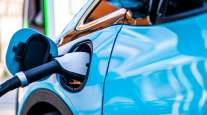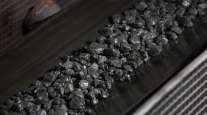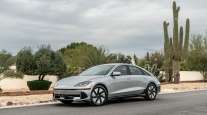The Orange County Register
Why Southern California Is the New EV Mecca

[Stay on top of transportation news: Get TTNews in your inbox.]
With the click of a mouse, a Karma Automotive technician brings a brand new electric vehicle to life.
You sit inside and marvel at the sleek console, the plush seats, the streamlined, jet-age dashboard.
Never mind that this new car doesn’t yet exist. Never mind that the driver’s seat you’re sitting on is actually a metal office chair.
Thanks to the magic of virtual reality, Karma Automotive’s designers can visualize how a car looks long before they build it.
“I can put you inside a car,” said David Hilton, who as Karma’s senior design director oversees work at the EV maker’s design studio in Irvine, Calif. “It can get fairly real. You get close. … I’ve done concept cars completely virtually.”
Karma is one of a handful of electric vehicle and battery innovators that have sprung up recently in and around Irvine, which has become a small but growing EV hub over the past few years.

RT1 trucks are assembled and tested in April before the new Rivian plant fully opens in Normal, Ill. (Brian Cassella/Chicago Tribune via Tribune Content Agency)
In addition to Karma, electric truck startups Rivian and Lordstown Motors have staked their flags here. Enevate, a battery designer that claims to have 400 patents on file or in the works, is based at the University Research Park. Rivian, which some auto industry analysts see as the “Tesla of trucks,” moved its headquarters to Irvine and Tustin from Michigan in 2020 to consolidate its engineering teams there and improve workflows, the company said.
It now occupies three Irvine buildings, one in Tustin, plus two others elsewhere in Southern California. It also plans to convert the Laguna South Coast Theater on Pacific Coast Highway into a showroom with a coffee bar, retail and events center.
With financial and technical support from major backers like Amazon.com Inc., Ford and T. Rowe Price, the company is worth $28 billion, Bloomberg estimated earlier this year.
Rivian’s adventure-oriented electric trucks and SUVs were scheduled to roll off the assembly line in June at its factory in Normal, Ill. That got pushed back to July, then September, due to headaches caused by the pandemic and a shortage of semiconductors and other components.
Bloomberg still considers Rivian to be “a front-runner in a large pool of startups,” and the company has been expanding rapidly. As of late July, Rivian employed at least 7,000 workers, about 1,400 of them based in Southern California, with more relocating here within the year, the company said.
Lordstown Motors, another electric truck maker struggling to get manufacturing underway, opened its new West Coast service center in Irvine earlier this year.
The 27,200-square-foot center will contain a sales team, service bays and a team of engineers working on entertainment systems. It’s the company’s first office outside its home base in Ohio.

Signage outside Lordstown Motors Corp. headquarters in Lordstown, Ohio, in May. (Dustin Franz/Bloomberg News)
Karma Automotive is perhaps Irvine’s oldest EV startup, created out of the ashes of the original Fisker EV company.
China-based Wanxiang Group bought the company out of bankruptcy in 2014 and changed the name a year later to Karma Automotive. In 2017, Karma’s luxury hybrid Revero started rolling off the assembly line at the company’s factory in Moreno Valley, selling for around $130,000 each.
Now, the new GS-6 hybrid is being built there, with prices in the $85,000 to $105,000 range. Karma plans to start making its fully electric GSe-6 by the end of the year or in early 2022.
Why Southern California is a new EV mecca, with Rivian, Lordstown, and Karma in Irvine https://t.co/H2y9PejXSj — O.C. Register (@ocregister) August 2, 2021
The 550,000-square-foot building has the capacity to build 15,000 cars, but there are only about 1,200 Karmas on the road, said Jeff Holland, Karma’s communications director.
So the company has been selling its technology to help other automakers manufacture their own electric cars. On July 1, Karma began manufacturing the Club Car Current for Austin-based AYRO, an all-electric light delivery truck that sells for just under $24,000.
Before coming to Irvine, Hilton worked for an automotive design firm in Shanghai because “Shanghai was where it was happening.”
“We used to say, ‘Shanghai or die,’ ” Hilton said. “Now, it’s pretty much, ‘Irvine or cry.’ ”
Irvine is, in reality, a smaller EV hub within a bigger Southern California hub.
A 2020 report by the Los Angeles County Economic Development Corp. found California is fast becoming a leading research, design and manufacturing center for EVs, and Southern California has an outsized part in that development.
With 119,200 workers in the EV industry and related jobs as of 2018, five Southern California counties accounted for 43% of EV jobs in the state, the report found.
“Greater L.A. has a unique and fast-growing EV industry ecosystem,” Lawren Markle, spokesman for the economic development corporation, said in an email. “SoCal’s gravitational pull on EV companies has increased, and it makes sense for them to grow here.”
By moving to Southern California, startups gain access to EV talent, EV suppliers, conventional and electric carmakers and R&D of all kinds, he said. And they get access to “a big EV market that is accelerating, thanks to forward-thinking public policy.”
Southern California’s EV cluster is heavily concentrated in downtown Los Angeles, the South Bay and Orange County, the report said.
And there’s good reason.
California already accounts for nearly half of EV sales in the United States, with much of those cars now driving on Southern California roads.
Los Angeles, Orange, Riverside and San Bernardino counties accounted for 40% of the 369,364 battery-powered vehicles registered in the Golden State last year, figures from the California Energy Commission show. That’s a total of 140,022 Teslas, Chevy Bolts, Nissan Leafs and other EVs crowding onto freeways and boulevards, and 1.2% of all vehicles in the region.
Another 38% of the state’s EV’s are in the Bay Area, where battery-powered vehicles made up 2.5% of all registered vehicles.
While EVs account for just a fraction of auto sales today, hundreds of startups around the world are betting the market is about to explode as state and federal governments seek to expand the number of electric vehicles on the road.
Automakers also are gearing up. General Motors, Ford, Hyundai, Kia, Volkswagen and others are planning to have a full line of EVs in the next 15 years. GM plans to offer 30 new EVs by 2025, including the Hummer EV pickup. Ford unveiled its F-150 Lightning pickup earlier this year. Volvo’s entire lineup will be electric by 2030, and Mercedes-Benz said on July 22 it expects EVs and plug-in hybrids to account for half of its sales by 2025.
Around 50 EV models are available today, and nearly 130 models are expected by 2023, according to the Edison Electric Institute, a trade association for electric companies.
“Right now, (EV sales are) minuscule. It’s under 1.8%,” said Ed Kim, chief analyst for AutoPacific, an Orange County-based research and consulting firm. But AutoPacific projects EV sales will see a fivefold jump to 1.3-1.4 million a year by 2026, up from 262,000 electric vehicles in 2020. The Edison Electric Institute predicted EV sales will surpass 3.5 million per year by 2030.
“Tesla proved a decade ago that a startup could completely upend a very established and very conservative industry,” Kim said. “That really kicked the EV market share to the next level.”
Want more news? Listen to today's daily briefing below or go here for more info:
Distributed by Tribune Content Agency, LLC




